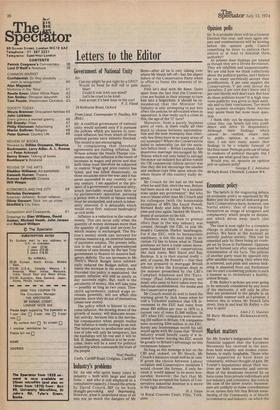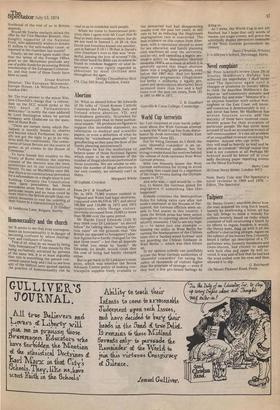Market matters
Sir: .Mr Towler's indignation about the financial support that the European Movement has received in the past, from both wealthy and modest contributors, is really laughable. Those who have supported us have done so voluntarily, without thought of gain. Mr Towler's imputations about their motives are both unworthy and untrue. Most of the donations received by us have come from private individuals and not industry and commerce. But even in the case of the latter source, businessmen are unlikely to make contributions to us, unless they felt that British membership of the Community is of benefit to commerce and industry, on which the livelihood of the 'rest of us in Britain depends. .
Would Mr Towler similarly attack the offer by Air Vice-Marshal Bennett, that doughty supporter of the National Front, who apparently wishes to donate £1 million to the anti-market cause, as reported in the Guardian last month?
Finally, let me once again make clear that the terms of the Foreign Office grant to the Movement preclude any use of public funds for promoting British membership of the European Community, and that none of these funds have been so used.
Ernest Wistrich Director, The European Movement,' Europe House, IA Whitehall Place, London SW1
Sir: The true answer to the minor Winston Churchill's charge that "a referen dum on the ECC would strike at the very heart of Parliamentary democracy" is surely the case adduced by Lord Hartington when he parted company with Gladstone on the question of Home Rule: "There are certain limits which Parliament is morally bound to observe and beyond which Parliament has norally not got the right to go in its relations with the constituents The constituents of Great Britain are the source of power, at all events in the House of Commons."
To have bound this country to the Treaty of Rome without the express consent of the electors was the most monstrous act in our constitutional history. To say, as MacMillan once did, that there is no constitutional precedent for a referendum on a single issue is just humbug. Certainly the Constitution rests upon precedents; but those precedents arose from the decision of particular issues and no issue could be more vital to the British people than one which threatens to vest the ordering of their future in a supranational body.
J. D. Godber
22 Sandcross Lane, Reigate, Surrey



































 Previous page
Previous page